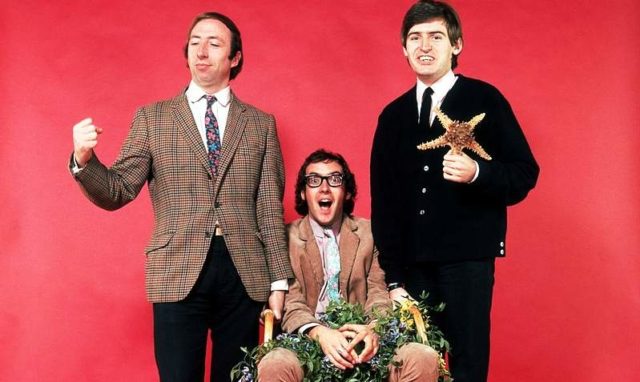
The unlikeliest of pop stars, their artistic tentacles stretched far and wide throughout the 60s and 70s cultural landscape
The popular culture of the 60s and 70s rarely, if ever, leaves me stuck for ideas for a new post. Ideas sometimes come in the most unpredictable of places, however. For example, while on a leg of the North Coast 500 of Bonny Scotland last week, just outside Durness on the far north-west corner to be precise, a short shuttle to the UK’s most northerly point, Cape Wrath, my lovely wife and I went into a cafe within an artisan craft community and at the counter were a pile of very expensive looking photography books. ‘Help yourself‘, said the assistant, ‘They’re free.’ So, of course, I did, not even the threat of a contribution from HRH Prince Charles on the book jacket was enough to put me off. The book was entitled, ‘Mike McCartney’s North Highlands.’ Now this struck a chord with me. Could this be the same Mike McCartney who was once Mike McGear, younger brother of Paul McCartney, lead singer and composer of 60s pop and comedy group The Scaffold and later GRIMMS? On further examination of the inside cover, it surely was! And this got me thinking whilst driving our camper van through the breathtaking scenery of that part of Scotland. There really was more to The Scaffold than just Lily The Pink. As far as 60s credentials go, few could compete with The Scaffold, whether you liked them or not. They appeared on everything from Top of The Pops to The Basil Brush Show to cutting edge satirical comedy and poetry shows to ads for insipid beer to public information films to gigs at the prestigious Talk of the Town in that London and even their own TV series! For a few years at the end of the 60s until the early 70s The Scaffold were everywhere.
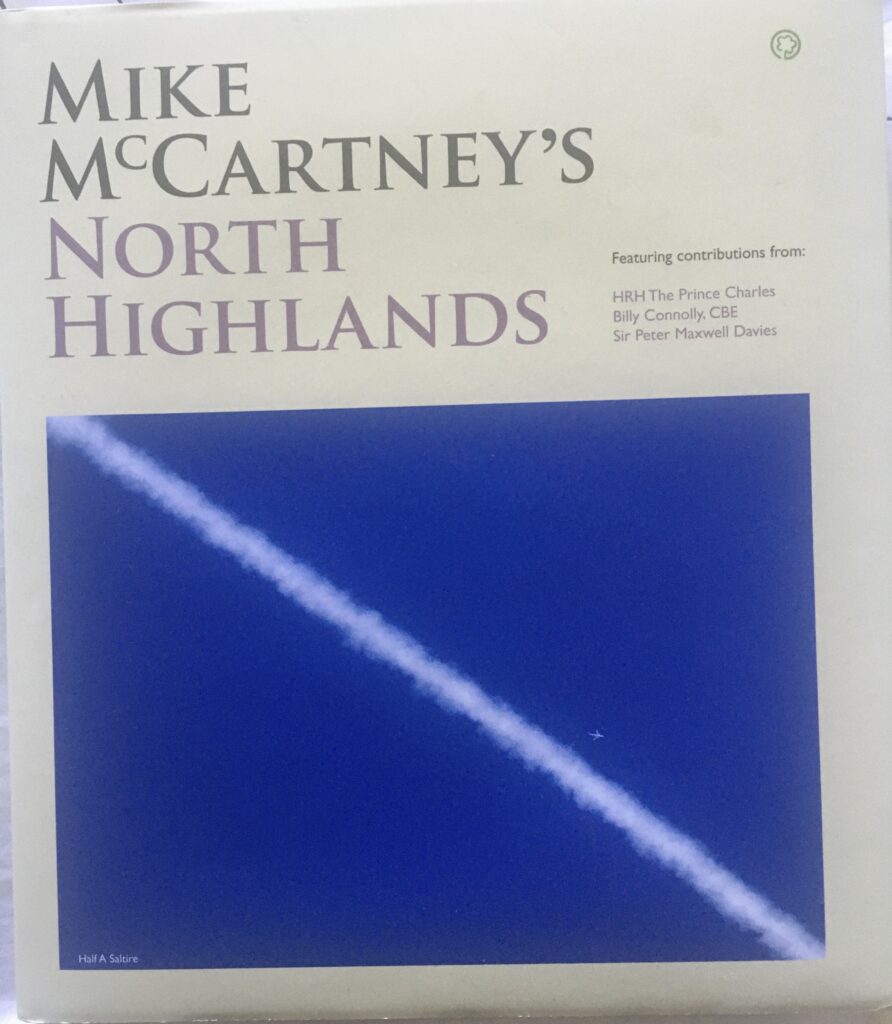
The Scaffold were Mike McGear, who changed his name from McCartney to create a bit of artistic distance from his older brother Paul although it was the worst kept secret in showbiz, Roger McGough and John Gorman who all met in Liverpool in the early sixties. Rather than a pop group, were really a poetry/drama/comedy/musical act so beloved of the Edinburgh Fringe at the time and they appeared there many times before becoming well-known. They were originally called The Liverpool One Fat Lady Electric Show. ‘Two Fat Ladies‘ being the bingo call for the number 88, so as they lived in Liverpool 8 they became ‘One Fat Lady.’ But that wasn’t going to work long-term so they became The Scaffold after the classic French thriller starring Jeanne Moreau, Lift To The Scaffold. It’s often forgotten that it’s a rather grim name for such a fun group. So far, so bohemian, but that was about to change.
They were spotted at the Edinburgh Fringe and eventually signed for The Beatles‘ label Parlaphone Records and were even managed by Brian Epstein for a while. But it’s when they became famous that their story really begins…….
I remember quite well the first time I saw The Scaffold. Although I can’t be 100% certain, I’m pretty sure it was on an edition of that late 60s early Saturday evening floppy cheeseburger of ‘chat,’ Dee Time (See Dee Time: When The Sixties Really Began). I’ve narrowed it down to November 4 1967 and they appeared singing their soon-to-be first hit, Thank U Very Much. It’s a song still remembered by anyone over the age of 50 due to the infectious nature of its chorus and has been used on all sorts of ads ever since. Must be nice in terms of royalty payments. Note the phonetic use of ‘U’ in the title, a few years before Slade’s deliberately poor spelling was even thought of. Clearly there was something a little different about this group.

They looked like the most unlikely of pop stars but the song rocketed to No. 4 in the hit parade and made them a household name (although few households have a scaffold in their living room, I’d imagine). Written by McGear, the line ‘Thank u very much for the Aintree Iron‘ continues to confound those trying to work out what this item actually is. McGear refuses to explain and many increasingly odd theories have been propounded. One bizarre suggestion was from someone who claimed to have heard McGear explain that it was a reference to Brian Epstein who lived in Aintree and he was a cockney rhyming slang ‘iron hoof.’ This sort of language was not unusual in the 60s, of course, and might have explained why McGear is so reticent to explain its meaning. But McGear refutes this theory completely as Epstein didn’t even live in Aintree and I believe him. I can’t help but think, though, it’s something rude or even defamatory hence McGear’s reticence to reveal its meaning. But the mystery rumbles on to this day and there’s nothing like a good mystery to keep the memory of a group alive.
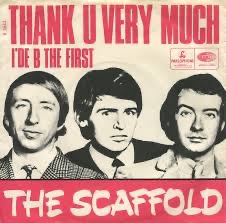
Their follow-up Do You Remember, written by McGear and McGough, didn’t have the catchiness or singalong quality of Thank U Very Much and only reached No. 34 in the hit parade. Talking about remembering, I also do remember seeing them performing this in white tuxedos on the almost forgotten Roger Whittaker children’s TV show, replacing Crackerjack during the summer, Whistle Stop. I really wasn’t too impressed with this waxing although to listen to it now the lyrics were very different to Thank U Very Much and were very sixties and very Roger McGough to say the least. Nice!
Sun was high
So was I
Clouds were low
Down below….
But their musical zenith was just around the corner and in November 1968 Lily The Pink was unleashed on an unsuspecting world. It roared to No. 1 all over Europe and Asia and spent 4 weeks in the top spot in the UK and a massive 25 weeks in the chart. I even had the single! Again, it was that singalong quality that made it so successful and as a song, everyone who lived through that era will remember it and be able to recite a couple of verses. Although they had a couple of minor hits over the next few years, it’s not just their chart successes that make them interesting, I feel. It was only after Lily The Pink that The Scaffold, in my view, became really interesting.
Between 1969 and 1973 The Scaffold were ubiquitous throughout popular culture. For example, they were regular guests on a range of TV variety shows, often sharing these shows with some strange bedfellows.
I’ve already mentioned The Scaffold’s possible first ever TV appearance on the 4 November 1967 edition of Dee Time but their appearance on the same show a year and a half later happened to be the day before the Apollo moon landing astronauts returned to Earth. This would explain TV astronomer Patrick Moore’s appearance on the show but not legendary British actor Wilfrid Hyde-Whyte. Whether The Scaffold performed a song is unknown but they were up against the variety might of Genxculture favourite Clodagh Rodgers and one-hit-wonders Zager and Evans who were on their way to the No.1 spot with ‘In The Year 2525.’ A suitably space-age song for a suitably space-age edition of Dee Time (Wilfred Hyde White notwithstanding). The weird juxtaposition of guests on Dee Time was a regular aspect of the programme and Genxculture will be returning to this strange variety melange very soon (See Dee Time: When The Sixties Really Began).
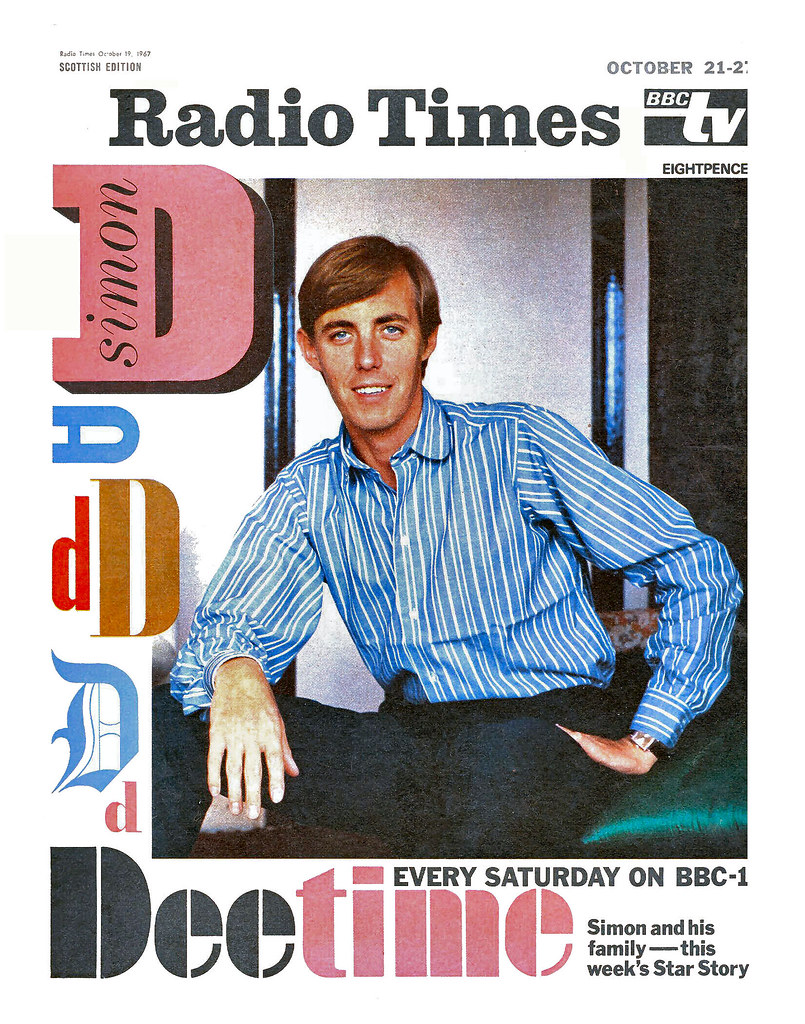
As well as Crackerjack and Whistle Stop their TV appearances were regular and they performed on many wide and varied TV series of the 60 s and 70s including Top of The Pops (obviously), Ready Steady Go, The Golden Shot, The Basil Brush Show (excellent!), Doddy’s Music Box and the 60s alternative to TOTP pop show All Systems Freeman with Fluff Freeman.
In early 1968 The Scaffold were the resident musical act in all five episodes of a virtually forgotten satirical late night (or at least late in those days) Saturday show entitled ‘At The Eleventh Hour.’ Billed by the Radio Times as ‘An end of the week look at the world or an end of the world look at the week.’ It was similar in content to That Was The Week That Was‘ and, from the little I remember of it, it was a slightly more demanding watch. Roger McGough also appeared as ‘himself’ reading his poetry. As well as The Scaffold it starred a young Miriam Margolyes and Oz magazine’s Richard Neville. 60s radical or what? The show also featured a Ray Davies of The Kinks penned current affairs song every week. He is quoted as saying that it was one of the most enjoyable jobs he ever had as he was given the topic for the song on Thursday, wrote it on Friday and it was recorded by the show’s singer, Jeanie Lambe, on Saturday and he received £25 per song. Lot of money in those days! Sadly, most of the songs are lost and most of the programmes have been inevitably wiped although it’s said two episodes are still intact in the BBC archives. I have a vivid recollection of Roger McGough reciting a poem entitled ‘At The Eleventh Hour‘ at the end of one of the shows. Pretty audacious TV even in 1968. Interestingly, on a BBC viewers’ feedback programme of the time called Talkback, hosted by, of all people, the legendary sports commentator David Coleman, At The Eleventh Hour was accused of being blasphemous! Sounds great but it was the sixties and fifties attitudes were still fairly prevalent.
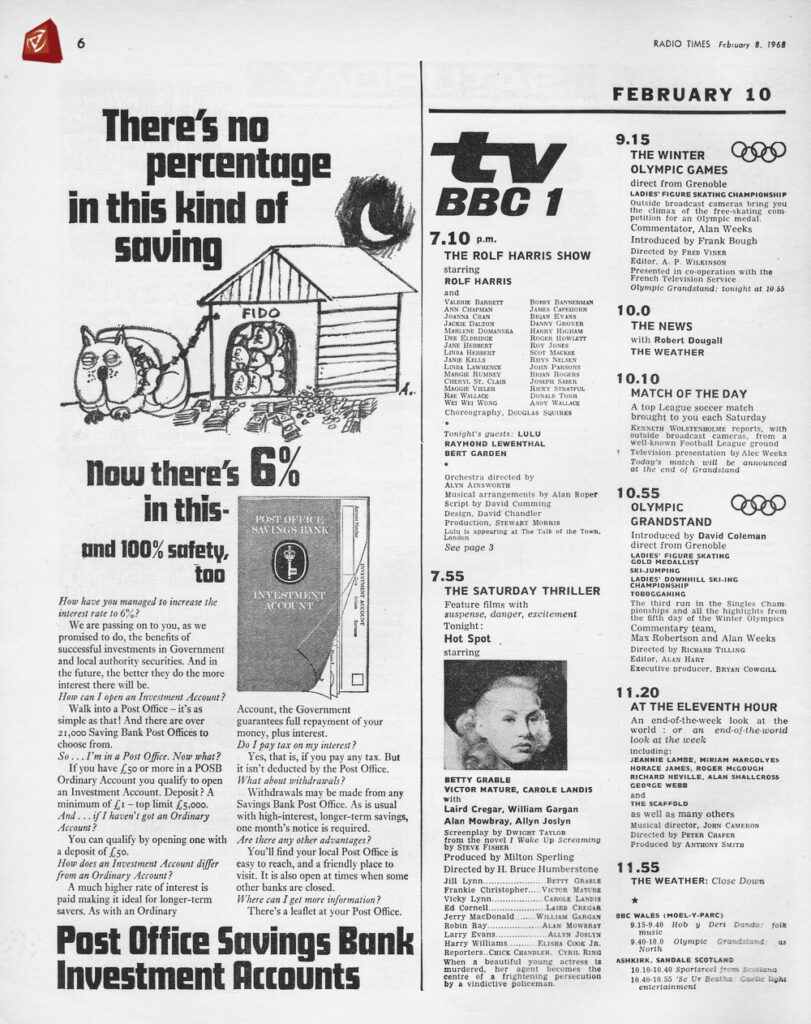
They recorded the theme song to a curious film starring Warren Mitchell called All The Way Up in 1970. The story of a ultra-ambitious business man and zealous social climber featured an excellent cast included Richard Briars, Kenneth Cranham and, another Genxculture favourite, Adrienne Posta (See Adrienne Posta: The 70s ‘It’ Girl). Recently shown on the always excellent Talking Pictures TV, it was a waste of everyone’s talent including The Scaffold’s. But a film soundtrack allowed them to tick off yet another genre.

In 1971 they were given their own BBC children’s TV series, Score With The Scaffold. This allowed their anarchic side to emerge more fully and this was hugely popular with kids. But, you’ve guessed it, no episodes of this show still exist and I have only a few memories it. The main one being the theme tune which was a version of their single 2 Days Monday from 1966 and the chorus, ‘Is everybody happy? You bet your life we are…‘ Rather chillingly, a guest on the final show of the second series was friend of The Royals and various politicians, Jimmy Savile….

In early 1971, as a precursor to decimalisation, The Scaffold were asked to write and record five short songs to help people get their heads around this fundamental societal change. The 5-minute programmes entitled ‘Decimal Five‘ went out straight after Nationwide each weeknight. The establishment tones of newsreader Robert Dougall explained how the new monetary system would work and The Scaffold sang the short ditties as aide-memoires. It’s strange that so many people still remember these one-line songs. The ones I remember were ‘Use your old coppers in sixpenny lots, meaning old pennies could only be used in multiples of six after Decimalisation Day on February 15 1971. Also One pound is a hundred new pennies, which might seem like stating the bleeding obvious now but was quite a quantum leap in thinking for people then. Even Max Bygraves released a decimalisation single!
Not content with one Public Information Film they were also asked to do another about the more prosaic subject of turning right safely whilst driving. The refrain ‘Nice and easy gets you there‘ became a very seventies grim juxtaposition between two young people dying horribly in a car crash and the alternative scenario of the young man being successful in his sexual conquest. And it was all down to being able to turn right safely.
But as well as PIFs The Scaffold were also happy to make a fast buck from a bit of TV advertising. And who could blame them! To the tune of Lily The Pink they advertised Watney’s Pale Ale in their trademark white tuxedos in 1969, changing the lyrics of their blockbuster hit slightly. Inevitable, I suppose and I hope they got paid a packet. And it does look quite strange now to see famous people drinking alcohol in adverts.
When Carla Lane wrote the long running series Liverpool-set comedy series The Liver Birds it made sense to have a Liverpool group do the theme tune. And who were the Liverpool group of the moment in 1969? Why, The Scaffold of course and their self-penned theme is still strongly identified with that long running series.
The Scaffold’s association with The Beatles didn’t end with Mike McGear either. Mike was one of the individuals taken along on the legendary Magical Mystery Tour ( see Magical Mystery Tour: What A Long Strange Trip It Was) and it was McGear who recommended the wonderful The Bonzo Dog Doodah Band to Paul when he was looking for an act to perform in the strip club scene of the film (see The Bonzo Dog Doo-Dah Band: Still So Far Ahead, It’s Beautiful…!). The Scaffold had worked with The Bonzos before and worked with them again after they ‘split up’ in the early 70s as GRIMMS. Roger McGough even wrote the bulk of the dialogue for Yellow Submarine but, for some reason, was uncredited. Now if that’s not interesting, I don’t know what is! However, he is reported to have received £500 for his contribution, a pretty tidy amount in the 60s but I still think I’d have liked a credit. The Scaffold also sang backing vocals on various Beatles‘ albums, often uncredited.
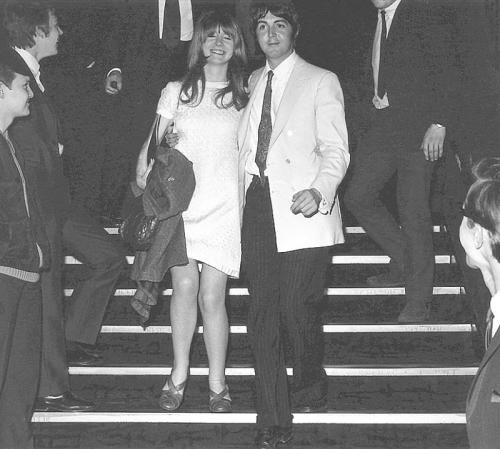
The Scaffold never really split up properly, they just became involved in their own particular interests. Roger McGough worked with The Mersey Sound poets Adrien Henry and Brian Patten, became a prolific and hugely successful writer of poetry, eventually began presenting Poetry Please on BBC Radio 4 (which he still does) and is now President of The Poetry Society. John Gorman appeared in a number of 70s films such as Up The Chastity Belt with Frankie Howerd, Alan Parker’s excellent ‘Melody‘ and Terry Gilliam’s ‘Jabberwocky.’ He eventually joined the cast of Tiswas, went on to write and appear in the adult version OTT and continued to write scripts for Chris Tarrant. Mike McGear (now McCartney again) had a relatively successful solo career, formed GRIMMS with the great Viv Stanshall and the sadly recently departed Neil Innes and later devoted his time to photography, as we have seen above.
All have reformed at various times to perform as The Scaffold and all are happily still very much with us.
They may not have looked or even sounded like pop stars but what an amazing and hugely enjoyable cultural trip they had.
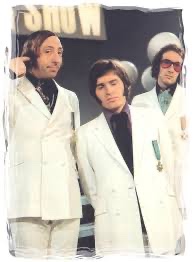
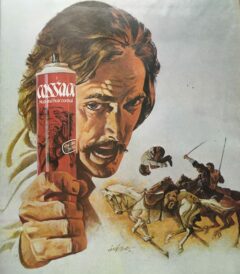
[…] The Scaffold: The Group Who Put The (Thank) ‘U’ Into Ubiquitous […]